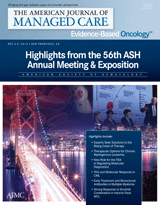- Center on Health Equity & Access
- Clinical
- Health Care Cost
- Health Care Delivery
- Insurance
- Policy
- Technology
- Value-Based Care
Promising Results for Elotuzumab Presented in Session on Multiple Myeloma
In March 2014, Dana Farber Cancer Institute’s Kenneth C. Anderson, MD, raised expectations at the annual gathering of the National Comprehensive Cancer Network when he said it wouldn’t be long before patients and clinicians in multiple myeloma (MM) practice would have “a monoclonal antibody or 2,” the new class of therapy that trains the patient’s immune cells to attack the cancer.
Based on the results presented at the 56th Annual Meeting of the American Society of Hematology (ASH) in San Francisco, Anderson’s prediction is right on schedule. On December 8, 2014, Anderson’s colleague at Dana Farber, Paul G. Richardson, MD, presented final results from a phase 1b/2 study of elotuzumab in combination with lenalidomide and dexamethasone for relapsed/refractory MM patients, including 73 who had already been treated with an average of 2 other therapies.1
Results show highly encouraging overall response rate (ORR) and progression-free survival (PFS), with the responses even better at the lower dose of 10 mg/kg of elotuzumab than the higher dose of 20 mg/kg. However, during the question-and-answer period Richardson warned, “We have to be careful how we interpret that.”
Elotuzumab, given by intravenous infusion, is being developed by Bristol-Myers Squibb in collaboration with AbbVie. The therapy binds to signaling lymphocytic activation molecule F7 (SLAMF7), giving it a different mechanism of action from other monoclonal antibodies under study, daratumumab and SAR650984, which target the CD38 protein. These therapies were stars at ASH 2014, with studies spotlighted in a press conference and a major lecture at the conference. The FDA granted breakthrough therapy status to the combination of elotuzumab with lenalidomide and dexamethasone in May 2014, based on promising phase 1 results. Daratumumab gained breakthrough status in May 2013 as a single agent.2
The phase 2 study included patients who had 1 to 3 prior therapies, including those with at least 1 prior therapy from the phase 1 study; their median age was 63 years. Half the patients received 10 mg/kg of elotuzumab, while the other half received 20 mg/kg of the drug, and treatment was in 28-day cycles. Patients also received oral lenalidomide at 25 mg for days 1 through 21 and oral dexamethasone (28 mg, plus 8 mg on days when the elotuzumab was given). This pretreatment was designed to manage infusion reactions. Notably, ORR were 92% among patients in the 10-mg/kg group who responded to treatment compared with 76% for those in the 20-mg/kg group.Median PFS was 32 months for the 10-mg/ kg group and 25 months for the 20-mg/kg group.
EBO
A stringent complete response or complete response was observed in 14% of patients, with a very good partial response seen in 43%; another 27% had a partial response. Richardson said researchers were struck by both the quality and durability of these responses. “It’s important to see, because many patients were on therapy for a number of years,” he noted. Common adverse events were diarrhea (66%), which Richardson described as manageable; fatigue (56%); muscle spasms (62%); constipation (51%); nausea (48%); and upper respiratory tract infections (47%).
References
1. Richardson PG, Jagannath S, Moreau P, et al. Final results for the 1703 Phase 1b/2 study of elotuzumab in combination with lenalidomide and dexamethasone in patients with relapsed/refractory multiple myeloma. Blood. 2014;124 (21): abstract 302.
2. Elotuzumab receives breakthrough therapy designation for multiple myeloma. http://www.myelomabeacon.com/news/2014/05/19/elotuzumab-breakthrough-therapy-designation-multiple-
myeloma/. Published May 21, 2014. Accessed December 17, 2014.

Quality of Life: The Pending Outcome in Idiopathic Pulmonary Fibrosis
February 6th 2026Because evidence gaps in idiopathic pulmonary fibrosis research hinder demonstration of antifibrotic therapies’ impact on patient quality of life (QOL), integrating validated health-related QOL measures into trials is urgently needed.
Read More
Exploring Racial, Ethnic Disparities in Cancer Care Prior Authorization Decisions
October 24th 2024On this episode of Managed Care Cast, we're talking with the author of a study published in the October 2024 issue of The American Journal of Managed Care® that explored prior authorization decisions in cancer care by race and ethnicity for commercially insured patients.
Listen
Building Trust: Public Priorities for Health Care AI Labeling
January 27th 2026A Michigan-based deliberative study found strong public support for patient-informed artificial intelligence (AI) labeling in health care, emphasizing transparency, privacy, equity, and safety to build trust.
Read More

